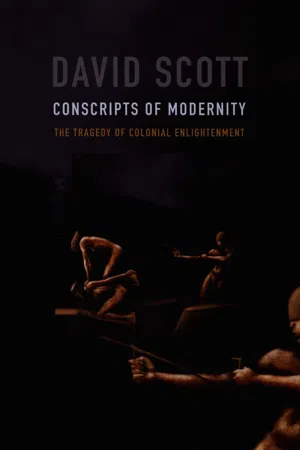
- English
- PDF
- Available on iOS & Android
About this book
Scott explores the political and epistemological implications of how the past is conceived in relation to the present and future through a reconsideration of C. L. R. James's masterpiece of anticolonial history, The Black Jacobins, first published in 1938. In that book, James told the story of Toussaint L'Ouverture and the making of the Haitian Revolution as one of romantic vindication. In the second edition, published in the United States in 1963, James inserted new material suggesting that that story might usefully be told as tragedy. Scott uses James's recasting of The Black Jacobins to compare the relative yields of romance and tragedy. In an epilogue, he juxtaposes James's thinking about tragedy, history, and revolution with Hannah Arendt's in On Revolution. He contrasts their uses of tragedy as a means of situating the past in relation to the present in order to derive a politics for a possible future.
Frequently asked questions
- Essential is ideal for learners and professionals who enjoy exploring a wide range of subjects. Access the Essential Library with 800,000+ trusted titles and best-sellers across business, personal growth, and the humanities. Includes unlimited reading time and Standard Read Aloud voice.
- Complete: Perfect for advanced learners and researchers needing full, unrestricted access. Unlock 1.4M+ books across hundreds of subjects, including academic and specialized titles. The Complete Plan also includes advanced features like Premium Read Aloud and Research Assistant.
Please note we cannot support devices running on iOS 13 and Android 7 or earlier. Learn more about using the app.
Information
Table of contents
- Contents
- Prologue
- One: Futures Past
- Two: Romanticism and the Longing for Anticolonial Revolution
- Three: Conscripts of Modernity
- Four: Toussaint’s Tragic Dilemma
- Five: The Tragedy of Colonial Enlightenment
- Epilogue
- Notes
- Acknowledgments
- Index